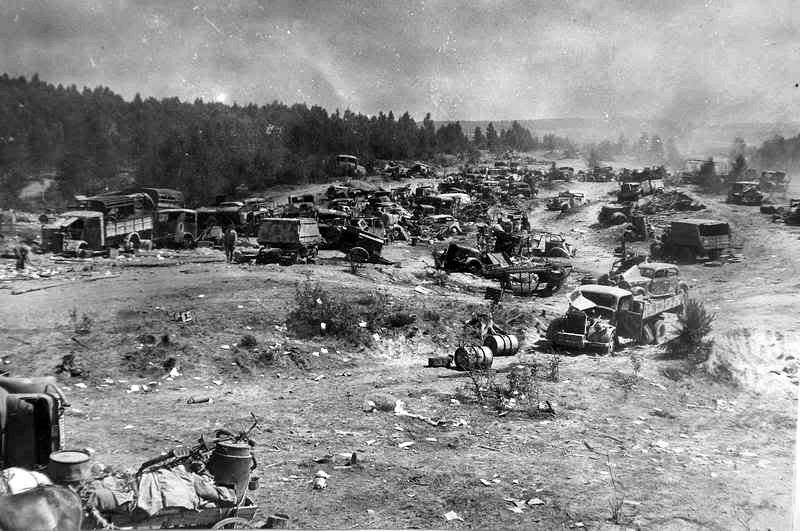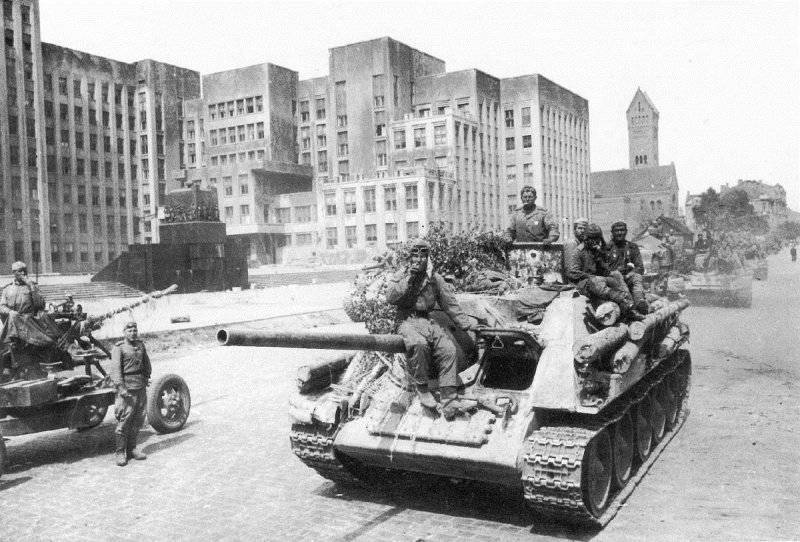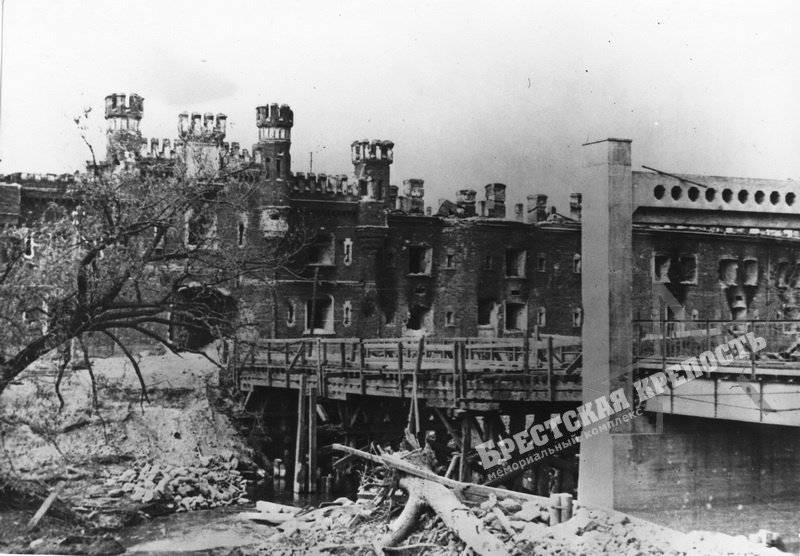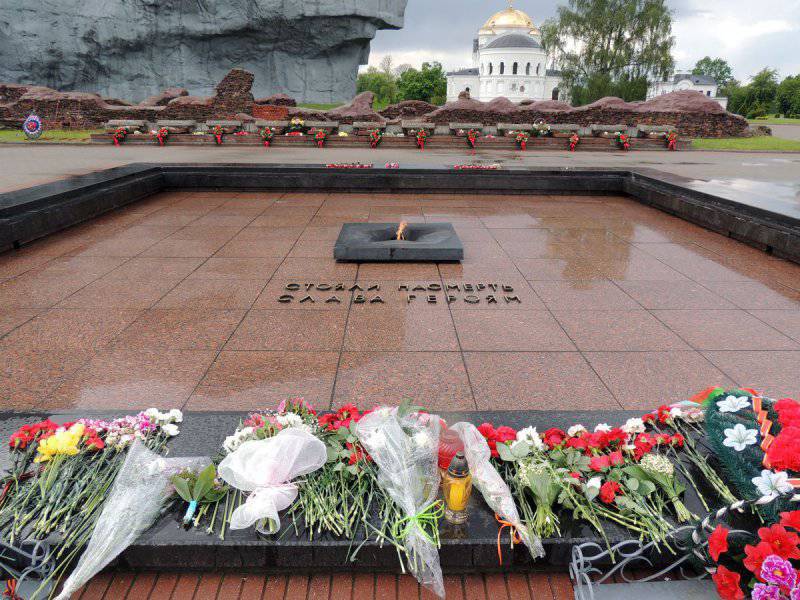70 years ago Brest was liberated from the Nazi invaders
Residents of Brest faced a war already early in the morning of 22 June 1941. German troops occupied the city in the early hours of the war. The Red Army left him without a fight. At the same time, separate centers of resistance remained in the city. Fights for the Brest railway station went on for a very long time. The defenders of the station took refuge in deep and branched basements under the building, from which the nazis could not smoke them for several days. As a result, they just began to flood the basement, and this forced the last defenders of the station to surrender.
Despite the fact that the city was taken in the first hours of the war, it went down in history forever, as an example of military glory and valor, the Brest Fortress and its garrison. The defense of the fortress was carried out by separate units of the 6 and 42 rifle divisions of the 28 rifle corps, who simply did not have time to go out of the fortress to the deployment sites, as well as the military personnel of the 17 th Red Banner Brest Detachment and other parts of the Western Special Military District. The Soviet units remaining in the fortress offered fierce resistance to the invaders. The organized resistance of the defenders of the fortress continued until 30 June 1941 of the year, by this point Minsk had already fallen. And separate isolated centers of resistance in the fortress remained until the second half of July, 1941. According to local residents, shooting in the fortress could be heard in the first days of August.

The column of the 9 Army of the Wehrmacht, defeated in Belarus
For more than three years, Brest and the Brest Fortress were under the yoke of the German occupation. All these years have passed under the sign of legalized terror. A very large part of the city’s population in 1941 was made up of Jews. Before the war, up to 22 thousands of Jews lived in the city, which was more than 40% of its inhabitants. There were also a number of refugees from German-occupied Poland, also mostly Jews. Mass executions of Jews began in the city as early as July 1941. According to the information available from the reports of the German punitive detachments in July 1941, they shot 4435 people, of whom more than 4's thousands were Jewish.
In December, the Brest ghetto was established in the city of 1941, which existed until October of the 1942 year. As of December 1941, there were 18 thousands of Jews in it. Almost all of them were tortured and killed by the Nazis. On the night of October 15, the ghetto 1942 was surrounded by parts of the German police, and an operation was launched to eliminate it, which lasted until October October 18. Of the entire Brest Jewish community, only 19 were lucky to escape, the community practically ceased to exist. Needless to say, the inhabitants of the city were very much waiting for the liberation by Soviet troops.
Brest was liberated by the Red Army during the Lublin-Brest operation, which was conducted by the troops of the 1 of the Byelorussian Front, commanded by Marshal Konstantin Rokossovsky. According to the plan of this operation, the Soviet troops with concentrated attacks, bypassing the Brest fortified area, were to defeat the fascist German grouping in Brest and Lublin, further developing the attack on Warsaw. The outcome of the operation was to be the exit to the Vistula.

Soviet troops in Minsk
By a curious coincidence, the 70 Army, which took part in the Lublin-Brest operation and advanced around the city from the south-west, was commanded by Colonel-General (title awarded on 26 on July 1944) Vasily Stepanovich Popov. In 1941, Vasily Popov was still Major General and commanded the 28 rifle corps, which included the 6 and 42 rifle divisions stationed in the Brest region. Fate gave the General a unique chance to get even with the Germans for the bitterness of the defeats of June 1941 of the year.
From July 5 to July 28, 1944, units of the 28th, 61st, 65th, 70th, 16th Air Armies, as well as the Dnieper flotilla and horse-mechanized groups freed all the district centers of Brest region. The main blow was delivered by the left wing of the 1st Belorussian Front, parts of which were advancing in the Kovel-Lublin direction. By July 20, more than 400 settlements were liberated, including the regional centers of the Volyn region. July 20, Soviet troops reached the Western Bug River, to the Soviet border. On the same day, advanced units crossed the river and entered Poland. On July 22, the first Polish city - Helm was liberated, it was occupied by the 7th Guards Cavalry Corps. After another 2 days of fighting, the Red Army liberated Lublin. For this success, 16 units and formations of the 1st Belorussian Front were given the honorary name - Lublinsky.
On the right flank of the operation, fierce battles with the Hitlerites were fought by the 28, 48, and 65 armies, as well as the horse-mechanized group. With the release of army units at the Svisloch-Pruzhany line, as well as at the close approaches to Brest, prerequisites were created for encircling the entire Brest group of enemy troops. This task was to be solved by the forces of the troops of the 28 and 70 armies. In this case, the enemy is well prepared for defense. In the area of Brest, the Nazis created a very powerful knot of defense; some forts of the Brest Fortress were also included in the system of their deeply echeloned fortifications. However, the Germans did not succeed in the heroic defense of the fortress, which the units of the Red Army led in 1941 in June.

Holm Gate of Brest Fortress
July 28 Soviet troops from the 28, 61 and 70 armies entered Brest and liberated the city. In memoirs about the events of those days, Senior Lieutenant D. M. Neustroyev, commander of the reconnaissance company of the 48 Guards Rifle Division from the 28 Army recalled: “I remembered the attack and the assault of the city of Brest and the fortress for my whole life. These were unforgettable and hot days. Our division was advancing not on the left flank of the 28 army, the fighters of the 160 rifle division from the 70 army fought south of us. When we finally entered the city, huge ashes appeared in its place. At the site of many houses, there were only pipes blackened by fire, which stood like gloomy crosses on a German cemetery. The streets of the city were littered with the corpses of German soldiers, as well as clogged with destroyed artillery and various enemy equipment. ”
The fighting for the city really was fierce in nature, as evidenced by the considerable losses of the Brest group of Hitler troops, which are confirmed by both warring parties. According to Soviet data, in the battles for Brest, the enemy only killed 7 thousands of people who were killed. The nature of the fighting is evidenced by a very small number of prisoners taken by Soviet troops, all 110 people.
As a result of the successful completion of the Lublin-Brest operation, the expulsion of the Nazi invaders from the territory of Belarus ended. During the offensive, the fighters and commanders of the Red Army fought 260 kilometers and captured very important bridgeheads on the Vistula. These bridgeheads created favorable conditions for the further defeat of the enemy troops in the Warsaw area and became the prologue for the complete liberation of the territory of Poland.
Today, the city and the fortress on the Bug can visit everyone. Brest is a city with 1000-year history (in 2019, it will officially mark this date), which is always welcome to guests and annually receives tens of thousands of tourists from Russia. One of the business cards of the city, of course, is the Brest Fortress. Nowadays, anyone can visit the battle sites of June 1941 of the year, inspect the remaining fortifications, the Brest Fortress memorial complex, visit the fortress defense museum, honor the memory of the fallen defenders and residents of the city.
Based on materials from open sources.

Information